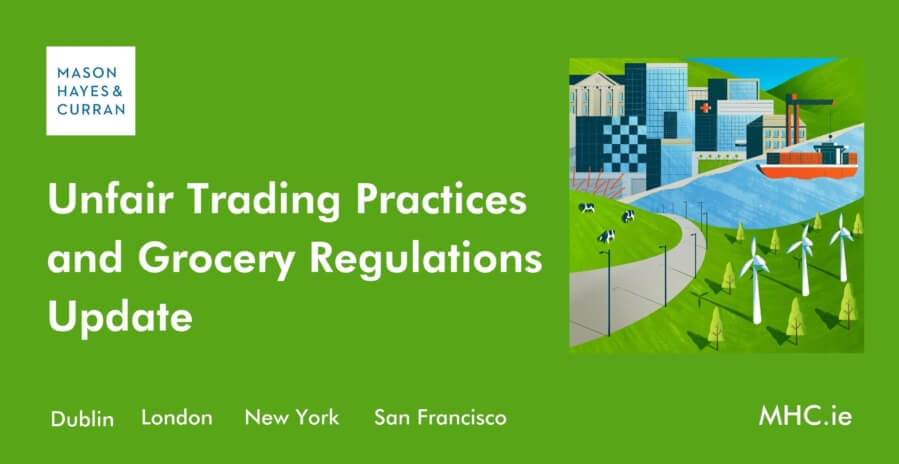
The European Union (Unfair Trading Practices in the agricultural and food supply chain) Regulations 2021 (UTP Regulations) transpose into Irish law the EU Directive on Unfair Trading Practices in business-to-business relationships in the agricultural and food supply chain. A summary of the EU Directive available here. The UTP Regulations introduced new requirements for supply agreements between food suppliers and buyers where the supplier has relatively weaker bargaining power than the buyer based on annual turnover.
Supply agreements entered into after 28 April 2021 are already subject to the rules in the UTP Regulations. However, supply agreements that were entered into before this date were given a one-year grace period. These agreements must also be compliant with the new rules by 28 April 2022. It is advisable that buyers review their current agreements well in advance of this date to ensure that their agreements are compliant.
The interim enforcement authority identified in the UTP Regulations is the Minister for Agriculture, Food, and the Marine. A new regulator is expected to be established this year. As part of its 2022 Spring Legislative Programme, the Irish Government identified the Agriculture and Food Supply Chain (Market Transparency) Bill as priority legislation for the upcoming legislative session. A draft of the Bill has not been published yet. However, the Government has confirmed that it will establish a new authority, the National Food Ombudsman, which will be responsible for enforcing the UTP Regulations in Ireland along with a role in analysing and reporting on price and market data. Minister McConalogue has stated that once established, the National Food Ombudsman will be one “with real teeth and one that will help shine a light of transparency on the sector.”
Under the UTP Regulations, investigations can be initiated and conducted by the enforcement authority either on its own initiative or on the basis of a complaint from a supplier. The penalties for committing an offence under the UTP Regulations include a fine of up to €500,000 and imprisonment of up to three years. If an offence under the UTP Regulations is proved to have been committed with the consent, connivance or approval of a director, manager, secretary or officer of a company, this person, as well as the company, is guilty of an offence.
The UTP Regulations cover similar ground as the Grocery Regulations introduced in 2016, and for which the enforcement authority is the Competition and Consumer Protection Commission (CCPC). This overlap creates confusion and is likely to cause difficulties for both compliance and enforcement. The CCPC has indicated that the Grocery Regulations will be revoked on 31 March 2022, which would bring an end to the CCPC’s responsibility for enforcement in the grocery sector.
Conclusion
While we await Government action on establishing the National Food Ombudsman, buyers are advised to review their existing agreements with food suppliers to ensure that they are compliant with the rules.
For more information on the impact of the UTP Regulations, or for advices on how to ensure your new or existing supply agreements are compliant, contact a member of our Food, Agriculture & Beverage team.
The content of this article is provided for information purposes only and does not constitute legal or other advice.
Share this:




